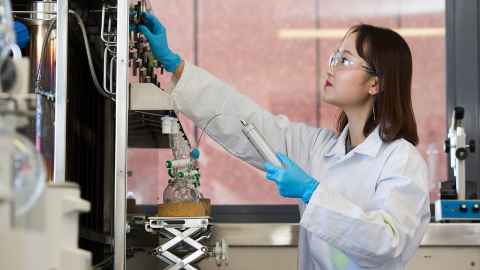Chemical sciences for human health
Advances in chemical science underpin all aspects of modern medicine from disease treatment to sanitation, diagnosis, detection and the understanding of disease mechanism and progression.

To ensure healthcare development keeps pace with the many healthcare challenges facing our society, novel chemical science research is vital.
We dedicate our research to making an impact in this area both locally and internationally. Key topics include understanding disease mechanisms, design of novel targeted drugs and therapeutics for their treatment. We also examine the development of new devices and sensors to monitor health and diagnose disease.
Research topics
Cancer
Cancer will affect one in three people during their lifetime. With our study of many different cancers, our researchers are developing new treatment strategies such as small molecule chemotherapeutics, immunotherapies (vaccines), tumour-inhibiting metal complexes, antibody-drug conjugates and protein-protein modulators.
Infectious disease and antimicrobials
Infectious diseases are caused by organisms such as bacteria, viruses, fungi or parasites. There is a growing concern regarding the emergence of virulent pathogens that are resistant to current treatments. Our staff are working to develop new antimicrobial therapies that combat these drug-resistant pathogens. We also target neglected tropical diseases, tuberculosis and viral infections.
Neurodegenerative and psychiatric conditions
Neurodegenerative diseases such as Parkinson’s and Alzheimer’s have no cure. We investigate the underlying mechanisms of these neurodegenerative conditions to help inform new treatment strategies. We are also working on finding new treatments for psychiatric conditions such as depression, a leading disease burden globally.
Diabetes and obesity
Diabetes mellitus is a metabolic disorder which, if left untreated, can cause serious long-term complications. Our researchers are developing alternatives to current treatments, which could also assist in weight management.
Target identification and drug discovery
Modern drug discovery is becoming increasingly target-based and hypothesis-driven. We use chemical probes and develop tools to identify new targets (such as proteins) and characterise the properties of drugs that can inform the development of new therapeutic agents for a variety of diseases. Our research includes joint theoretical and experimental approaches to screening drugs and understanding the mechanism of action of enzyme inhibitors.
Natural products
Natural products (secondary metabolites) contain a level of structural and chemical diversity that is unsurpassed by artificial libraries. Our staff are designing new synthetic routes to several complex biologically active natural products from both terrestrial and marine sources, enabling their exploration as new therapeutic agents.
Devices and sensors
Rapid detection and effective monitoring are vital for the effective management and treatment of many diseases. Our researchers study how we can detect biological markers, such as antioxidants and neurotransmitters sensitively and selectively, with the sensing events translated into various readout modes, such as electrical or optical signals. We are also developing new biomarkers for cancer using both peptide and DNA based sensing technology.
Our researchers
Professor Bob Anderson
- Time-resolved spectrophotometry
- Radical mechanisms
- Anticancer prodrugs
Professor David Barker
- Small molecules for disease treatment - cancer and microbial infections
- Synthesis of biologically active natural products
- Synthesis of biosensors for disease detection
Distinguished Professor Dame Margaret Brimble
- Peptide-based antibiotics and bioactive molecules
- Adjuvants for vaccines
- Anticancer agents and antibody-drug conjugates
Professor Brent Copp
- Medicinal chemistry of anti-infectives
- Natural products – isolation, synthesis, structure-activity
Associate Professor Daniel Furkert
- Natural product synthesis
- New reaction mechanisms
- Drug discovery
Professor Christian Hartinger
- Medicinal inorganic chemistry
- Supramolecular chemistry
- Bioanalytical chemistry
Professor Paul Kilmartin
- Electrochemical sensors
- Photoresponsive drug delivery vectors
- Photoactive coordination compounds
Professor Duncan McGillivray
- Nanomaterials
- Surfaces
- Biophysical chemistry
Dr Davide Mercadante
- Molecular simulations of protein dynamics
- Atomistic, computational studies of protein-bioactive interactions
- Development of algorithms for covalent docking
Associate Professor Viji Sarojini
- Alternative therapeutics against drug-resistant pathogens
- Receptor targeting in cancer therapy using tumour targeting peptides
Professor Jonathan Sperry
- Neuropsychiatric drug development
- Anti-infectives
- Biologically active natural products
Professor Jadranka Travas-Sejdic
- Optical and electrochemical biosensors
- Advanced materials with antimicrobial properties
Professor Geoff Willmott
- Mechanics of soft particles
- Resistive pulse sensing